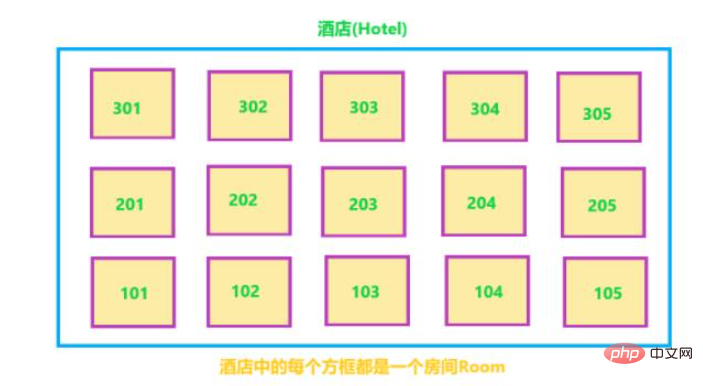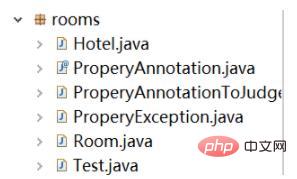Maison >Java >javaDidacticiel >Comment implémenter un système de gestion hôtelière en utilisant du code Java
Comment implémenter un système de gestion hôtelière en utilisant du code Java
- WBOYWBOYWBOYWBOYWBOYWBOYWBOYWBOYWBOYWBOYWBOYWBOYWBavant
- 2023-05-01 11:19:061700parcourir
1. Analyse des exigences
Si nous voulons mettre en œuvre un système de gestion hôtelière, nous devons d'abord analyser les exigences commerciales du système de gestion hôtelière :
1. Quelles fonctions le système de gestion hôtelière doit-il mettre en œuvre ?
(1) Entrez une commande pour interroger toutes les chambres de l'hôtel ;
(2) Entrez un numéro de chambre pour réserver une chambre
(3) Entrez un numéro de chambre pour vérifier
(4) Entrez une commande pour quitter ; le système de gestion hôtelière ;
2. Quelle structure de données le système de gestion hôtelière utilise-t-il pour représenter les chambres ?
(1) Le système de gestion hôtelière utilise des tableaux pour stocker les chambres, ici nous utilisons un tableau bidimensionnel pour les représenter
3 Quels attributs avons-nous pour les chambres d'hôtel ?
(1) Numéro de chambre ;
(2) Type de chambre ;
(3) La chambre est-elle gratuite
4.
(1) Nous pouvons utiliser des annotations personnalisées pour y parvenir
2. Analyse du dessin

3. Structure du code

4. Implémentation du code
/**
自定义注解类:该类作用在房间类上。
*/
@Retention(RUNTIME) // 用该注解表示此自定义注解可以被外部映射到
@Target(TYPE) // 用该注解表示此自定义注解只可以作用在类上
public @interface ProperyAnnotation {}/**
当自定义注解类作用在房间实体类上时,该类是用来判断房间实体类上是否有:房间编号、房间类型、房间是否空闲这些属性的。
*/
public class ProperyAnnotationToJudge {
// 判断ProperyAnnotation注解的某个类中是否有某些属性的方法
public static void Judge () {
try {
// 使用反射机制来反射Room类
// 我这里的房间Room类放到了test包下,您可以自定义它的路径。
Class<?> c = Class.forName("test.Room");
// 判断Room类上是否存在@ProperyAnnotation注解
if (c.isAnnotationPresent(ProperyAnnotation.class)) {
// 如果Room类上存在@ProperyAnnotation注解就获取这个Room类中的全部属性
Field[] fields = c.getFields();
boolean isExist = false;
for (Field field : fields) {
// 如果Room类中存在房间编号、房间类型、房间是否空闲这些属性,就让isExist=true,否则抛出异常
if (item.getName().equals("rId") && item.getType().getSimpleName().equals("Integer")) {
for (Field item1 : fields) {
if (item1.getName().equals("rType") && item1.getType().getSimpleName().equals("String")) {
for (Field item2 : fields) {
if (item2.getName().equals("rFree") && item2.getType().getSimpleName().equals("Boolean")) {
isExist = true;
break;
}
}
}
}
}
}
if (!isExist) {
throw new ProperyException("Room类中不存在房间编号、房间类型、房间是否空闲这些属性");
}
}
} catch (ClassNotFoundException e) {
e.printStackTrace();
}
}
}/**
当ProperyAnnotation注解作用的房间实体类中没有房间编号、房间类型、房间是否空闲这些属性时,此类为抛出的异常类。
*/
public class ProperyException extends RuntimeException {
private static final long serialVersionUID = -8343113740914228496L;
public ProperyException () {}
public ProperyException (String msg) {super(msg);}
}/**
Room房间实体类
*/
@ProperyAnnotation
public class Room {
private Integer rId; // 房间编号
private String rType; // 房间类型
private Boolean rFree; // 房间是否空闲
public Room () {}
public Room (Integer rId, String rType, Boolean rFree) {
this.rId = rId;
this.rType = rType;
this.rFree = rFree;
}
protected Integer getrId() {
return rId;
}
protected void setrId(Integer rId) {
this.rId = rId;
}
protected String getrType() {
return rType;
}
protected void setrType(String rType) {
this.rType = rType;
}
protected Boolean getrFree() {
return rFree;
}
protected void setrFree(Boolean rFree) {
this.rFree = rFree;
}
@Override
public String toString() {
return "Room [" + rId + ", " + rType + ", "+ (rFree ? "有人入住" : "无人入住")+"]";
}
}/**
酒店管理实体类:用来管理房间的,其中包括查看所有房间状态、订房、退房功能。
*/
public class Hotel {
// 这里需要定义一个二维数组来表示房间,因为我们设想的酒店有很多层,且每层有很多你发件。
private static Room[][] rooms;
public Hotel () {
// 这里定义酒店为5层,且每层有9个房间
rooms = new Room[5][9];
// 这里我们来设置酒店的房间,由于酒店的房间很多,所以我们使用for循环来分别设置每个楼层。
for (int m = 0 ; m < rooms.length ; m ++) {
for (int n = 0 ; n < rooms[m].length ; n ++) {
// 第一层
if (m == 0) {
/*
这里我们的房间编号这样设置:
如果是是酒店的第一层楼的第一个房间,我们将房间编号设置成:101
我规定我们的酒店的楼层为1~5层;
我规定我们的酒店的第一个房间为1
所以如果我们用二维数组来表示酒店的楼层和第几个房间时,因为我们的二维数组的横纵坐标都是从0开始的,所以我们需要分别加上1,此时房间编号的表达式就为:
(m + 1) * 100 + n + 1
当m = 0时:
n = 0:房间编号为101;
n = 1:房间编号为102;
n = 2;房间编号为103;
...
当m = 1时:
n = 0:房间编号为201;
n = 1:房间编号为202;
...
...
*/
rooms[m][n] = new Room((m + 1) * 100 + n + 1, "单人豪华房", false);
}
// 第二层
if (m == 1) {
rooms[m][n] = new Room((m + 1) * 100 + n + 1, "双人豪华房", false);
}
// 第三层
if (m == 2) {
rooms[m][n] = new Room((m + 1) * 100 + n + 1, "三人豪华房", false);
}
// 第四层
if (m == 3) {
rooms[m][n] = new Room((m + 1) * 100 + n + 1, "三人豪华房", false);
}
// 第五层
if (m == 4) {
rooms[m][n] = new Room((m + 1) * 100 + n + 1, "三人豪华房", false);
}
}
}
}
// 查看所有房间状态
public void queryAllRooms () {
for (int m = 0 ; m < rooms.length ; m ++) {
for (int n = 0 ; n < rooms[m].length ; n ++) {
System.out.println(rooms[m][n].toString());
}
}
}
// 使用房间编号订房
public void makeRoom (int rId) {
Room room = rooms[rId / 100 - 1][rId % 100 - 1];
// 如果该编号的房间已经有人订了
if (room.getrFree() == true) {
System.out.println("抱歉,请您订购其他房间,此房间已经有人居住!");
} else {
room.setrFree(true);
System.out.println("订房完成");
}
}
// 使用房间编号退房
public void existRoom (int rId) {
Room room = rooms[rId / 100 - 1][rId % 100 - 1];
// 如果该编号的房间本来就没有人居住
if (room.getrFree() == false) {
System.out.println("抱歉,请您退订其他房间,该房间没有人居住不需要退订!");
} else {
room.setrFree(false);
System.out.println("退房完成");
}
}
}/**
酒店的操作测试类:
*/
public class Test {
public static void main (String[] args) {
ProperyAnnotationToJudge.Judge();
Hotel hotel = new Hotel();
System.out.println("欢迎使用酒店管理系统,请认真阅读以下使用说明:");
System.out.println("请输入对应的功能编号:[1]查看房间列表; [2]订房; [3]退房; [0]退出系统");
Scanner scanner = new Scanner(System.in);
while (true) {
System.out.print("请输入功能编号:");
Integer i = scanner.nextInt();
if (i == 1) {
hotel.queryAllRooms();
System.out.println("酒店所有的房间已经加载完毕!");
}
else if (i == 2) {
System.out.print("请输入房间编号,房间编号为101~110、201~210、301~310、401~410、501~510:");
Integer rId = scanner.nextInt();
if (rId >= 101 && rId <= 110 || rId >= 201 && rId <= 210 || rId >= 301 && rId <= 310 || rId >= 401 && rId <= 410 || rId >= 501 && rId <= 510) {
hotel.makeRoom(rId);
} else {
System.out.println("请输入正确的房间编号!");
}
}
else if (i == 3) {
System.out.print("请输入房间编号,房间编号为101~110、201~210、301~310、401~410、501~510:");
Integer rId = scanner.nextInt();
if (rId >= 101 && rId <= 110 || rId >= 201 && rId <= 210 || rId >= 301 && rId <= 310 || rId >= 401 && rId <= 410 || rId >= 501 && rId <= 510) {
hotel.existRoom(rId);
} else {
System.out.println("请输入正确的房间编号!");
}
}
else if (i == 0) {
System.out.println("成功退出酒店管理系统!");
scanner.close();
return;
}
else {
System.out.println("请仔细阅读使用说明,输入正确的功能编号");
}
}
}
}Out résultat mis :

Ce qui précède est le contenu détaillé de. pour plus d'informations, suivez d'autres articles connexes sur le site Web de PHP en chinois!

